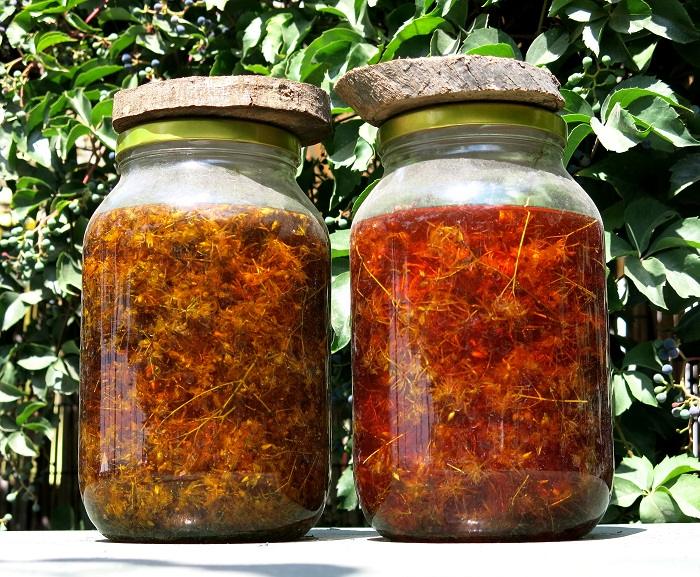St. John’s wort is a flowering plant that has been used for centuries for medicinal purposes. Some ancient cultures believed the plant — which got its name because it blooms around June 24, the supposed birthday of John the Baptist, and from “wort,” the old English word for “plant” – had mystical healing properties.
Ancient Greek physicians recommended St. John’s wort as an anti-inflammatory medicine and as an antidepressant. Today, the perennial plant is used to treat a variety of conditions, ranging from seasonal affective disorder to hyperactivity.
St. John’s wort is native to Europe, but today it is commonly found in the United States, Canada and Australia growing in meadows, woods and along roadsides. Although Australia once classified St. John’s wort as a weed, today the country grows it as a crop, producing one-fifth of the world’s supply.
The plant has multiple biologically active substances, including hypericin, rutin, hyperforin, quercetin and kaempferol. It is available in a number of formats, including as a dried herb, tea, tablet and as an essential oil. As always, check with your doctor first before taking any alternative medicine.
Fast, All-Natural Pain Relief With No Nasty Side Effects!
Let’s look at nine amazing ways St. John’s wort can heal — nine reasons you should keep it in your first-aid stockpile.
1. Antidepressant. Through the centuries, the most common use for St. John’s wort has been as an agent to combat mild and moderate depression and anxiety. Research studies, according to the University of Maryland Medical Center, indicate that St. John’s wort works as well as the selective serotonin reuptake inhibitors (SSRIs) that are in Prozac, Zoloft and Celexa.
Scientists have theorized that St. John’s wort works in a similar way as SSRIs because it helps boost the levels of mood-improving serotonin, dopamine and norepinephrine in the brain.
St. John’s wort also helps people with seasonal affective disorder (SAD), a condition that is linked to lack of sunlight. Studies show that symptoms often are reduced or relieved with a combination of St. John’s wort and phototherapy.
2. Pre-menstrual syndrome (PMS)
Many women have found that St. John’s wort helps reduce PMS symptoms, such as depression, fatigue and anxiety.
Researchers at the Institute of Psychological Studies found that PMS sufferers ages 18 to 45 who took St. John’s wort experienced physical and behavioral improvement over women who took a placebo.
3. Menopause symptoms
St. John’s wort also eases the symptoms of menopause. A Berlin study published in the journal Advance in Therapy of women found that St. John’s wort reduced the number and severity of hot flashes in perimenopausal, menopausal and post-menopausal women ages 43 to 65.
Another study published in the journal Menopause found that St. John’s wort eased psychological and psychosomatic symptoms of menopause.
4. Wound healing
Ancient healers used St. John’s wort flowers to make an oil to apply to wounds as a way of promoting natural healing of wounds, burns, boils, bruises and insect bites. The oil, which has antioxidant, antibacterial and antiviral properties, also works as a natural treatment for eczema and hemorrhoids.
5. Migraines
St. John’s wort may be useful in treating recurring headaches. The journal Phytomedicine reported that St. John’s wort might block pain receptors that cause migraine headaches.
6. Obsessive compulsive disorder (OCD)
St. John’s wort may help people who suffer with obsessive-compulsive disorder, a mental condition where people perform certain routines repeatedly.
Learn How To Make Powerful Herbal Medicines, Right in Your Kitchen!
Data from a study by the Dean Foundation for Health Research and Education rated patients who had St. John’s wort as “much” or “very much improved” when compared with participants who took a placebo.
7. Cancer
St. John’s wort may be useful in treating non-melanoma and melanoma skin cancer cells. Data from a Spanish study conducted in 2003 showed that hyperforin, a compound found in St. John’s wort, interferes the formation and growth of cancerous skin cells.
8. Alzheimer’s disease and dementia
A Swiss study published in the journal Brain Pathology demonstrated that St. John’s wort may protect against beta-amyloid plaques that have been linked with Alzheimer’s disease and with dementia.
9. Insomnia
Since it can affect the brain’s neurotransmitters, St. John’s wort can help promote better sleep. St. John’s wort contains compounds that relax the blood vessels and thereby improve blood flow to the brain. The plant will not necessarily help you sleep for longer periods, but it can help you sleep more deeply.
This article is for informational purposes only and is not intended to diagnose or cure any particular health condition. Please consult with a qualified health professional to determine which treatments are right for you and any individual health condition(s) that you may have.
What advice would you add? Share it in the section below:
Discover The Secret To Saving Thousands At The Grocery Store. Read More Here.
 Off The Grid News Better Ideas For Off The Grid Living
Off The Grid News Better Ideas For Off The Grid Living






